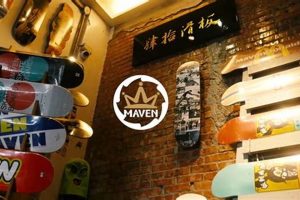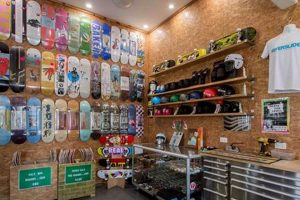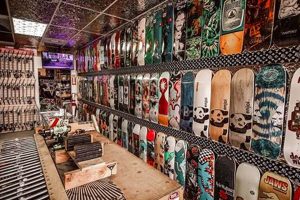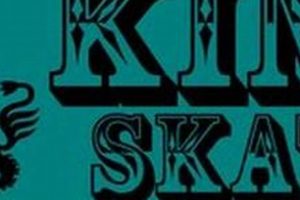A retail establishment specializing in skateboarding equipment, apparel, and related accessories located within the Orlando, Florida metropolitan area. These establishments typically offer a range of products including skateboards (complete boards and individual components like decks, trucks, wheels, and bearings), protective gear (helmets, pads), shoes, and clothing brands catering to the skateboarding lifestyle.
Such businesses serve a critical function in the local skateboarding community. They provide access to quality equipment necessary for participation in the sport, offer expert advice on product selection and maintenance, and often act as hubs for local skaters to connect and learn. Historically, these shops have played a role in fostering local skateboarding culture, sponsoring events, and supporting emerging talent.
The subsequent sections will delve into specific examples of these businesses, examining their offerings, community involvement, and contributions to the Orlando skateboarding scene. Further discussion will address the impact of online retail and evolving consumer preferences on these brick-and-mortar establishments.
Skateboarding Equipment and Maintenance Tips from Orlando Retailers
Local skateboarding retailers offer valuable insights into equipment selection, maintenance, and best practices for maximizing performance and longevity. These tips, derived from experienced staff, can benefit both novice and experienced skaters.
Tip 1: Select the Appropriate Deck Size: The deck width should correspond to the skater’s shoe size and skating style. Smaller decks (7.5″ – 8.0″) are typically preferred for technical street skating, while larger decks (8.25″ and up) are suitable for transition and park skating.
Tip 2: Invest in Quality Bearings: Bearings directly impact the speed and smoothness of the ride. Selecting reputable bearing brands with high ABEC ratings (though not the sole indicator of quality) ensures optimal performance. Regular cleaning and lubrication are essential.
Tip 3: Choose the Right Wheel Durometer: Wheel durometer (hardness) affects grip and ride quality. Harder wheels (99A and higher) are faster and more durable on smooth surfaces like skateparks. Softer wheels (78A – 90A) provide better grip on rougher terrain.
Tip 4: Maintain Tight Truck Kingpins: Loose truck kingpins can lead to instability and wobbles. Regular tightening of the kingpin nut is crucial for maintaining control. However, avoid overtightening, which can restrict turning ability.
Tip 5: Regularly Inspect and Replace Grip Tape: Worn grip tape reduces foot traction, compromising board control. Replace grip tape as needed to ensure a secure grip. Proper application techniques, such as removing air bubbles, are critical.
Tip 6: Store Skateboards Properly: Exposure to moisture and extreme temperatures can damage the deck and components. Storing the skateboard in a dry, climate-controlled environment prolongs its lifespan.
Tip 7: Protective Gear is Essential: Prioritize safety by consistently wearing a helmet, knee pads, and elbow pads. Proper sizing and fit are crucial for maximizing the effectiveness of protective gear.
Adhering to these guidelines, informed by the expertise of Orlando retailers, contributes to an enhanced skateboarding experience, reduced risk of injury, and prolonged equipment lifespan.
The following sections will address common skateboarding injuries and preventative measures, building upon the foundation of equipment knowledge.
1. Equipment Availability
The operational efficacy and cultural impact of a skate shop in Orlando are fundamentally tied to its ability to maintain a diverse and readily accessible inventory of skateboarding equipment. The provision of appropriate gear directly influences participation rates, skater progression, and the overall health of the local skateboarding scene.
- Range of Skateboard Components
Skate shops must stock a variety of components, including decks, trucks, wheels, bearings, grip tape, and hardware. Variations in deck size, truck type, wheel durometer, and bearing precision cater to diverse skating styles (street, park, transition) and skill levels. Insufficient component options limit skater customization and potentially hinder performance.
- Protective Gear Supply
The ready availability of protective gear, such as helmets, knee pads, elbow pads, and wrist guards, is crucial for promoting safe skateboarding practices. Stocking a range of sizes and styles encourages skaters to prioritize safety, particularly among novice participants. Lack of adequate protective gear increases the risk of injuries and potentially deters participation.
- Skate Shoe Selection
Specialized skate shoes provide enhanced grip, board feel, and durability compared to general athletic footwear. A comprehensive skate shop will offer a selection of skate shoe brands and models, catering to varying foot shapes and skating preferences. Limited skate shoe availability forces skaters to compromise on performance and potentially accelerates shoe wear.
- Maintenance and Repair Materials
Beyond providing initial equipment, skate shops should stock maintenance and repair materials, such as bearing lubricant, truck bushings, replacement hardware, and tools. These materials enable skaters to maintain their equipment in optimal condition and extend its lifespan. Insufficient maintenance supplies force skaters to rely on less effective alternatives or prematurely replace components.
The strategic sourcing and inventory management practices of an Orlando skate shop directly impact its ability to serve the local skateboarding community. A well-stocked shop not only facilitates participation but also fosters a culture of safety, skill development, and equipment longevity, ultimately contributing to the vibrancy of the skateboarding scene.
2. Community Hub
The skate shop in Orlando, functioning as a community hub, significantly impacts local skateboarding culture. Its role extends beyond retail sales, fostering social connections, skill development, and a sense of belonging among skaters. The shop becomes a central meeting point where individuals share experiences, learn from one another, and collectively contribute to the growth of the sport.
The connection between the skate shop and the local community is demonstrably evident through various initiatives. Shops frequently sponsor local skateboarding events and competitions, providing financial support, prizes, and a platform for showcasing local talent. Organized group skate sessions and workshops held at or initiated by the shop encourage participation, skill-sharing, and mentorship among skaters of varying experience levels. These activities cultivate a strong sense of camaraderie and shared identity. Many Orlando-based shops also maintain bulletin boards or online forums where skaters can connect, arrange meet-ups, and share information about local skate spots and events. This active engagement strengthens the link between the shop and its clientele.
The skate shops position as a community hub promotes skateboarding’s accessibility and inclusivity within Orlando. By providing a welcoming environment and fostering a supportive network, the shop helps to break down barriers to entry and encourage participation from individuals of diverse backgrounds. This role is crucial for sustaining a thriving local skateboarding scene and ensuring its continued growth. The challenges involved in maintaining this role include consistent engagement with the community and adapting to evolving skater needs, all while balancing the demands of running a business. The success of these establishments underscores the importance of community engagement in fostering a robust local skateboarding ecosystem.
3. Expertise Offered
The provision of informed guidance constitutes a critical function of any credible retail establishment specializing in skateboarding equipment within Orlando. The expertise offered directly impacts customer satisfaction, equipment selection accuracy, and the overall safety and progression of local skateboarders.
- Equipment Selection Guidance
Knowledgeable staff should possess the ability to assess a customer’s skill level, intended skating style, and physical attributes to recommend suitable equipment. This includes advising on appropriate deck size, truck type, wheel durometer, and bearing selection. Accurate guidance prevents novice skaters from purchasing unsuitable gear, potentially hindering their progress and increasing the risk of injury. Misinformed recommendations can lead to dissatisfaction and diminished confidence in the sport.
- Technical Troubleshooting and Repair Advice
Experienced staff should be capable of diagnosing common skateboarding equipment issues, such as bearing noise, truck wobble, or deck delamination. Furthermore, they should offer practical advice on performing basic repairs and maintenance tasks, including bearing cleaning, truck tightening, and grip tape replacement. This service empowers skaters to maintain their equipment in optimal condition, extending its lifespan and minimizing costly repairs. Inadequate technical support leaves skaters vulnerable to equipment malfunctions and potential safety hazards.
- Skatepark and Spot Recommendations
Staff members familiar with the Orlando skateboarding scene can provide valuable insights into local skateparks, street spots, and other suitable skating locations. This knowledge enables skaters, particularly newcomers, to discover appropriate environments for skill development and social interaction. Furthermore, staff can advise on relevant local regulations and etiquette, promoting responsible skateboarding practices. Lack of local knowledge limits a skater’s ability to explore the Orlando scene and integrate into the community.
- Product Knowledge and Trend Awareness
Skate shop staff should maintain a comprehensive understanding of available products, including new releases, technological advancements, and emerging trends within the skateboarding industry. This knowledge allows them to effectively communicate the benefits and features of various products to customers. In addition, awareness of current trends enables them to cater to evolving skater preferences and maintain a relevant inventory. Stagnant product knowledge can lead to a loss of customer trust and reduced competitiveness within the retail landscape.
The expertise offered by Orlando skate shops serves as a cornerstone of the local skateboarding community. Informed guidance not only facilitates equipment purchases but also promotes skill development, safety, and a deeper appreciation for the sport. The presence of knowledgeable and passionate staff contributes significantly to the overall vibrancy and sustainability of the skateboarding scene.
4. Brand Selection
The curation of brands within a skate shop in Orlando directly reflects the shop’s identity, target demographic, and contribution to the local skateboarding culture. A carefully considered brand selection is paramount for attracting customers, fostering loyalty, and maintaining competitiveness within the retail landscape.
- Core Skateboard Brands
The presence of established, reputable skateboard brands (e.g., Baker, Anti Hero, Girl, Chocolate, Real) is essential for attracting serious skaters and validating the shop’s authenticity. These brands often dictate current trends in skateboarding and represent a commitment to quality and performance. A lack of core brands can deter experienced skaters from patronizing the shop, signaling a lack of understanding of the skateboarding market. The availability of signature models from professional skaters within these brands further enhances the shop’s appeal.
- Emerging and Independent Brands
The inclusion of smaller, independent brands distinguishes a skate shop and often appeals to customers seeking unique or alternative products. These brands may focus on specific niches within skateboarding (e.g., longboarding, cruiser boards, artistic decks) or emphasize ethical and sustainable production practices. Supporting emerging brands demonstrates a commitment to fostering innovation and diversity within the skateboarding industry. However, a balance must be struck between supporting independent brands and ensuring product quality and customer satisfaction.
- Apparel and Footwear Brands
Beyond skateboard hardware, the selection of apparel and footwear brands significantly contributes to the shop’s overall appeal. Popular skate shoe brands (e.g., Vans, Adidas Skateboarding, Nike SB, Emerica, Lakai) provide skaters with the necessary performance and durability features. Apparel brands offering skate-specific clothing (e.g., Dickies, Volcom, Thrasher) align with the skateboarding lifestyle and cater to skater preferences. A diverse selection of apparel and footwear enhances the shop’s ability to cater to a wider range of customer needs and preferences.
- Protective Gear Brands
The availability of reliable protective gear brands (e.g., Pro-Tec, Triple Eight, S-One) underscores the shop’s commitment to skater safety. Offering a range of helmet styles, knee pads, elbow pads, and wrist guards ensures that skaters can find gear that fits comfortably and provides adequate protection. Promoting safety through the selection of reputable protective gear brands contributes to a more responsible and inclusive skateboarding culture.
The strategic selection of brands within an Orlando skate shop shapes its identity, attracts customers, and influences the local skateboarding culture. A balanced approach, incorporating core skateboard brands, emerging brands, apparel and footwear, and protective gear, is crucial for creating a thriving and sustainable retail environment. The success of a skate shop is intrinsically linked to its ability to curate a brand selection that resonates with the needs and preferences of the local skateboarding community.
5. Repair Services
The provision of repair services by a retail establishment specializing in skateboarding equipment within Orlando is a critical component of its overall value proposition. These services address the inevitable wear and tear experienced by skateboarding equipment, ensuring longevity and optimal performance for customers.
- Bearing Maintenance and Replacement
Bearings are susceptible to contamination from dirt and debris, which diminishes their rolling efficiency. Repair services include cleaning, lubricating, and, when necessary, replacing bearings. Skate shops often offer specialized tools and solvents for bearing maintenance. Neglecting bearing maintenance can lead to reduced speed, increased effort, and eventual bearing failure. Shops offering these services provide a crucial benefit, particularly for skaters who lack the knowledge or resources to perform maintenance themselves.
- Truck Repair and Component Replacement
Trucks, the steering mechanism of a skateboard, can sustain damage from impacts and prolonged use. Repair services encompass replacing bushings (the rubber cushions that allow trucks to turn), pivot cups (the socket that houses the pivot), and occasionally the entire truck assembly. Damaged trucks can compromise stability and control, increasing the risk of accidents. Shops that provide truck repair services ensure that skaters can maintain their equipment in safe operating condition.
- Grip Tape Application and Replacement
Grip tape provides essential traction between the skater’s shoes and the skateboard deck. Over time, grip tape loses its abrasiveness and effectiveness. Repair services include removing old grip tape and applying new grip tape. Properly applied grip tape is crucial for maintaining board control and performing tricks. Shops offering this service ensure that skaters have a secure and reliable grip surface.
- Deck Repair (Limited)
While severely damaged skateboard decks are generally not repairable, shops may offer limited repair services for minor cracks or chips, often involving epoxy resin and reinforcement. This can extend the lifespan of a deck, particularly in areas prone to damage. However, it’s essential to understand that deck repairs are often temporary and may not restore the deck to its original strength. The availability of this service can provide a cost-effective solution for minor deck damage.
The provision of these repair services solidifies the skate shop’s role as a comprehensive resource for the skateboarding community in Orlando. By offering maintenance and repair options, these establishments contribute to the longevity of skateboarding equipment, promote safe skating practices, and foster a deeper connection with their customer base. These services often encourage repeat business and establish the shop as a trusted source of expertise and support within the local skateboarding scene.
6. Event sponsorship
Event sponsorship constitutes a critical marketing and community engagement strategy for a skate shop operating within the Orlando metropolitan area. These sponsorships offer a direct avenue for brand visibility, customer acquisition, and the cultivation of goodwill within the local skateboarding community. The alignment of a shop’s brand with relevant events reinforces its commitment to the sport and its participants.
- Financial Support for Competitions
Skate shops frequently provide financial backing to local skateboarding competitions, ranging from amateur contests to professionally sanctioned events. This support often covers venue rental fees, prize money, and marketing expenses. In return, the skate shop receives prominent branding opportunities, such as logo placement on event banners, website inclusion, and verbal acknowledgment during the event. The implications extend beyond immediate brand exposure; consistent support cultivates a reputation as a committed and integral part of the skateboarding scene, driving long-term customer loyalty.
- Product Endorsement and Gear Provision
Beyond monetary contributions, skate shops often donate skateboarding equipment and apparel as prizes for competition winners and participants. This strategy provides direct product exposure to a target audience, demonstrating the quality and performance of the shop’s offerings. Furthermore, sponsoring local skateboarders with gear enhances brand visibility within the community, as these sponsored riders often become influential brand ambassadors. The consistent provision of quality gear at events solidifies the shop’s credibility and reinforces its position as a trusted source for skateboarding equipment.
- Community Engagement and Workshops
Skate shops may sponsor community events, such as skateboarding workshops or demonstrations, aimed at promoting the sport and fostering skill development. These events provide an opportunity for the shop to engage directly with potential customers, offering advice, demonstrations, and personalized recommendations. Furthermore, sponsoring workshops for beginners introduces new individuals to the sport and positions the shop as a valuable resource for learning and skill improvement. The long-term benefits include increased participation in skateboarding and a growing customer base for the sponsoring shop.
- Venue Provision and Logistical Support
In some cases, skate shops may possess or have access to private skateparks or facilities suitable for hosting events. Sponsoring events by providing venue space and logistical support, such as staffing and equipment setup, significantly reduces the burden on event organizers. This type of sponsorship demonstrates a strong commitment to the local skateboarding community and fosters goodwill among event participants and organizers. The provision of a dedicated skateboarding venue can also attract larger and more prominent events, further enhancing the shop’s visibility and reputation.
The strategic deployment of event sponsorship activities serves as a crucial mechanism for an Orlando skate shop to cultivate brand recognition, foster community engagement, and ultimately drive sales. The symbiotic relationship between the shop and local events strengthens the skateboarding culture and ensures the continued growth and vitality of the sport within the region. These activities can lead to greater brand recognition, customer loyalty and sustainable revenue streams, further solidifying the skate shops role as a cornerstone of the skateboarding community.
7. Local Culture
The nexus between a skateboarding retail establishment and the local culture it inhabits is a multifaceted and significant relationship. For businesses identified as “skate shop orlando,” the interplay with local culture directly influences its identity, customer base, and overall contribution to the skateboarding community.
- Influence of Local Skate Spots and Styles
The physical environment of Orlando, including its architectural landscape, skateparks, and street spots, directly shapes the skating styles prevalent among local skaters. A “skate shop orlando” must understand and cater to these styles by stocking appropriate equipment (e.g., decks suited for technical street skating versus transition skating). The absence of this understanding results in a disconnect between the shop’s offerings and the needs of local skaters.
- Community-Driven Initiatives and Events
Local culture is actively shaped by community-driven skateboarding events, contests, and collaborative projects. “Skate shop orlando” often plays a pivotal role in supporting these activities through sponsorship, volunteer efforts, and providing a central meeting point for organizers and participants. Failure to actively participate in and support these events diminishes the shop’s connection to the community and its perceived value.
- Representation of Local Artists and Brands
Local skate culture often incorporates elements of local art, music, and fashion. A “skate shop orlando” that showcases local artists through deck designs, clothing collaborations, or in-store events demonstrates a commitment to supporting the broader cultural landscape. Neglecting to engage with local artists represents a missed opportunity to connect with a wider audience and contribute to the unique identity of the Orlando skateboarding scene.
- Diversity and Inclusion within the Skate Community
The local culture within Orlando’s skateboarding scene encompasses its demographics, attitudes toward inclusivity, and efforts to promote diversity. A “skate shop orlando” should strive to create a welcoming and inclusive environment for skaters of all backgrounds, skill levels, and identities. This involves stocking products that cater to diverse needs, promoting inclusivity through marketing materials, and actively addressing any instances of discrimination or bias. Failure to foster an inclusive environment can alienate potential customers and undermine the shop’s reputation within the community.
These interconnected facets highlight the importance of a “skate shop orlando” actively engaging with and contributing to the local culture. By understanding and reflecting the values, styles, and demographics of the Orlando skateboarding community, the shop can establish itself as a vital hub and a driving force in shaping the local skateboarding landscape.
Frequently Asked Questions
This section addresses common inquiries regarding skate shop orlando, providing succinct and authoritative answers to enhance understanding and clarify prevalent misconceptions.
Question 1: What factors influence the price of a complete skateboard?
The cost of a complete skateboard is determined by the quality and brand of its components, including the deck material (e.g., maple ply count and grade), truck construction (e.g., aluminum alloy composition and manufacturing process), bearing precision (e.g., ABEC rating and material), and wheel durometer and rebound. Reputable brands typically command higher prices due to rigorous quality control and performance standards.
Question 2: How frequently should skateboard bearings be cleaned and lubricated?
Bearing maintenance frequency depends on usage conditions. Skateboarding in dusty or wet environments necessitates more frequent cleaning (potentially weekly). Under typical conditions, bearings should be cleaned and lubricated every two to four weeks to maintain optimal rolling efficiency and prevent premature wear. Failure to maintain bearings can lead to decreased speed and potential bearing failure.
Question 3: What is the significance of skateboard deck width?
Skateboard deck width influences stability, control, and maneuverability. Narrower decks (7.5″ to 8.0″) are generally preferred for technical street skating, while wider decks (8.25″ and above) provide greater stability for transition and park skating. The appropriate deck width depends on the skater’s shoe size, riding style, and personal preference. An ill-suited deck width can hinder skill progression and increase the risk of imbalance.
Question 4: How does wheel durometer affect skateboarding performance?
Wheel durometer, measured on the A scale, indicates wheel hardness. Harder wheels (99A and above) offer increased speed and durability on smooth surfaces, such as skateparks. Softer wheels (78A to 90A) provide better grip and shock absorption on rougher terrain. The ideal wheel durometer depends on the skater’s preferred skating environment and riding style.
Question 5: What protective gear is essential for skateboarding?
Essential protective gear includes a properly fitted helmet, knee pads, elbow pads, and wrist guards. These items mitigate the risk of head injuries, joint damage, and fractures resulting from falls. Neglecting protective gear significantly increases the likelihood of severe injuries, particularly among novice skaters.
Question 6: How does climate affect skateboard maintenance?
High humidity and temperature fluctuations can damage skateboard components. Exposure to moisture can cause deck delamination, bearing corrosion, and truck rust. Storing skateboards in a dry, climate-controlled environment is essential for prolonging their lifespan. Neglecting proper storage can accelerate equipment deterioration and compromise performance.
This FAQ section provides a concise overview of fundamental considerations related to skate shop orlando and skateboard maintenance. It underscores the importance of informed decision-making in equipment selection and upkeep.
Subsequent sections will address advanced topics, including competitive skateboarding in Orlando and the evolution of skateboarding culture.
Conclusion
The preceding analysis has delineated the multifaceted role of skate shop orlando within the local skateboarding ecosystem. From equipment provision and repair services to community engagement and cultural stewardship, these establishments are integral to the sport’s vitality. The expertise offered, brand selection curated, and events sponsored significantly shape the experiences of skaters and the trajectory of the local scene.
The sustained success of these retail outlets hinges on their ability to adapt to evolving consumer preferences, embrace innovation, and maintain a genuine commitment to the skateboarding community. As the sport continues to evolve, skate shop orlando must remain dynamic, responsive, and dedicated to fostering a vibrant and inclusive environment for all participants. The future of skateboarding in Orlando depends, in part, on their continued efforts.







